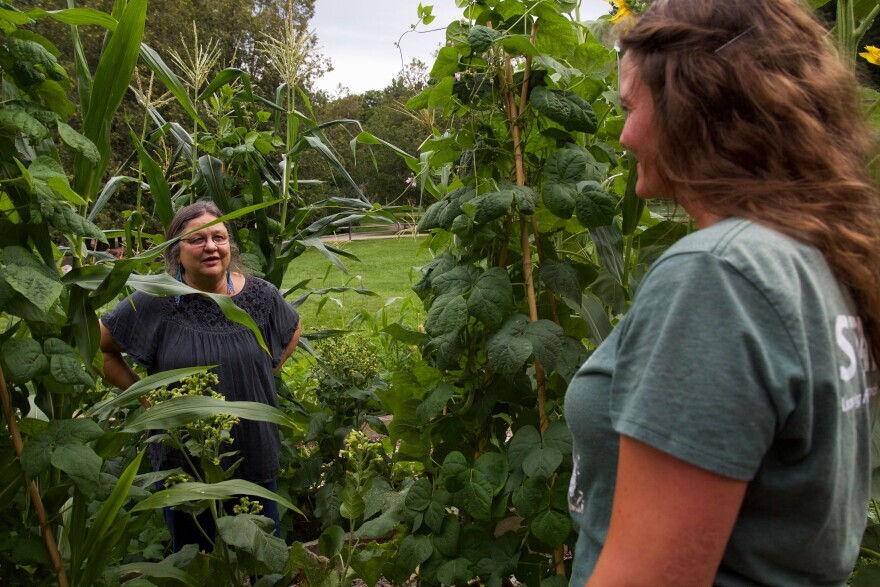How some Northeast organizations are trying to return land, decision-making power to people of color

Judy Dow, left, is an Indigenous educator who specializes in teaching traditional ecological knowledge. Here she chats with Shelburne Farms farm-based educator Cat Parrish. Over the summer and fall of 2021, Judy and the land institution partnered to grow an educational plot that would also provide seeds for Indigenous gardens across New England. (Elodie Reed/VPR)
On a windy but warm day earlier this year, Judy Dow walked between rows of corn, beans, squash and sunflowers at Vermont’s Shelburne Farms. A sign explained how the different plants nourish one another.
The purpose of this plot is both to educate visitors, and to produce seeds to share with Indigenous gardens across New England.
“So eat the vegetable, and then save the seed, ’cause what we want is the seed,” Judy said.
Judy specializes in teaching traditional ecological knowledge, and she is the executive director of Gedakina, a network focused on Native American women and their families.
For the past two decades, Judy has worked on educational programs with Megan Camp, Shelburne Farms’ program director and vice president. The garden is the pair’s latest joint project. They came up with the idea together.
“To take these walks and talks in the middle of the winter as we slip and slide down the road,” Judy said, “we get a lot planned.”
“Two old ladies, “Megan said as she and Judy laughed. “We call each other ‘the grandmothers.’”
Shelburne Farms started as an agricultural estate in the 1880s, and it’s on unceded homelands of the Winooskik band of the Abenaki.
Megan has been there for 38 years. She says while the nonprofit has partnered with Indigenous educators like Judy over time, George Floyd’s murder in 2020 — and the national discourse it sparked around systemic injustice — has made Shelburne Farms prioritize creating more authentic and reciprocal relationships.
And they’re not alone. Increasingly, land-based nonprofits are attempting to return land management to people of color who, for centuries, have been stripped of and denied that access.
Prior to European colonization, Abenaki and Mohican people stewarded the land in what we know today as Vermont. But now Indigenous people, together with other people of color, manage just 1% of the state’s farmland.
Nationwide, just over 6% of farmland is overseen by Black, Indigenous and people of color, or BIPOC. That’s despite BIPOC making up 40% of the country’s population.
For the rest of this story, including the audio version, please visit VPR.org.
